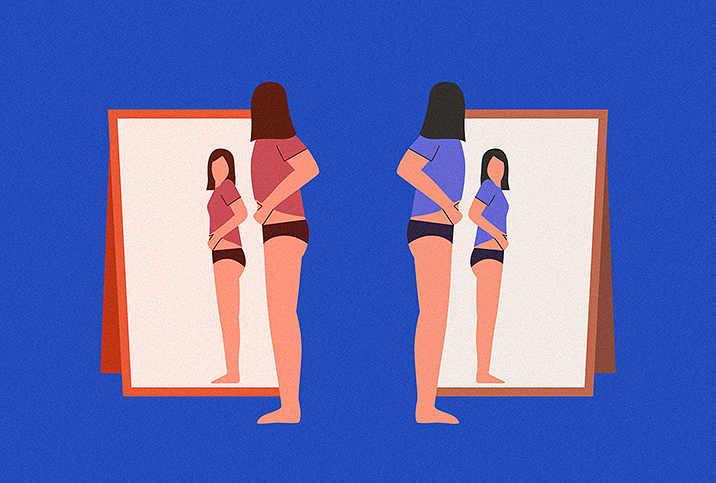Body Neutrality Is Your Path Out of Low Self-Esteem

The tide of body positivity on the internet and in culture hasn't swept all of us away; contrarily, many people have been left in its wake. After all, the pressure to love your body is a tall order for people who just don't feel ready. Putting so much pressure on loving your physical appearance can feel forced and uncomfortable, not to mention trapping us in an apparent dichotomy: You either love your body or hate it.
For some, body neutrality is a mythic third option. The idea is that you can accept your body for what it can do, meeting it where it is right now rather than focusing on loving every little bit of it. Body neutrality eschews the idea that the ultimate goal is body love, and instead focuses on body ambivalence.
People who live by body neutrality say its gift is that you do not have to love your body every day or feel like you are failing when and if you don't accept your current physical appearance. There's no pressure for positive self-talk or taking selfies. In place of that is the recognition and pleasure of appreciating what your body does for you, what it can do and how it functions now, even if it's not "ideal."
Let go of negative perceptions
So, who benefits from practicing body neutrality?
"Everyone," according to Alexis Conason, Psy.D., a clinical psychologist in New York City and author of "The Diet-Free Revolution."
"Body neutrality is particularly useful for people who are struggling with feelings of shame, criticism and hatred toward their bodies," Conason explained.
For those people, body positivity can cause anxiety. Not only do you dislike how you look, but you're also failing to be positive in the way ad campaigns and hashtags want you to be. The body neutrality movement is more of a middle ground. Instead of trying to lift yourself up by your bootstraps from low self-esteem to oozing with confidence, you can start by letting go of negative perceptions to reach—as the name suggests—neutral ground.
'Practicing body neutrality puts a person in the mindset to make life choices based on true needs and wants instead of insecurity and anxiety.'
"Body neutrality is a great step toward healing the relationship a person has with their body, especially if they've struggled with body image issues and eating disorders in the past," said Darcy Sterling, host of E! Network's "Famously Single" and creator of an online course called Jealousy Boot Camp.
"Practicing body neutrality puts a person in the mindset to make life choices based on true needs and wants instead of insecurity and anxiety," Sterling continued. "It can help someone release the negativity of intrusive thoughts and allow them to enjoy their life. When someone lets go of intrusive thoughts, the toxic self-deprecating doubts subside and allow for a more confident and secure mindset."
Body neutrality and intimacy
When intrusive negative thoughts about your body arise, they can dampen even the hottest flame, and practicing body neutrality can help you switch gears.
"Poor body image can have a profound impact on our sex lives," Conason said. "It can make us want to avoid sex altogether if we are uncomfortable about our partner seeing our body. It can also kill the mood if we are distracted by what we look like and not able to focus on the pleasure of our partner's touch."
These distractions can rob you of intimacy, leading to issues in the bedroom and beyond.
Practicing body neutrality leaves self-judgment out of the equation, making room for what should be the real focus of sex.
"Intimacy is so important in a relationship, and if there is a lack of intimacy, your partner will ultimately get frustrated and it could lead to destruction in your relationship if sex is consistently strained or avoided," Sterling said.
Practicing body neutrality leaves self-judgment out of the equation, making room for what should be the real focus of sex.
"Body neutrality can help someone get into the mindset of making intimacy more about the feeling between you and your partner instead of how you look during intimate moments. It can encourage someone to focus on their desires and fantasies rather than their appearance," Sterling added.
How the experts say to do it
To start putting body neutrality into practice, begin by looking inward.
"Take an assessment of your life, beginning from childhood to the present, noting significant themes, trends and patterns related to your body," instructed Vicki Coleman, a behavioral health specialist.
Once you have taken an assessment, try to become more self-aware. "Body neutrality starts with recognizing the thoughts that you are having about your body," Conason said.
There are a few processes you can try to achieve that end:
- Thought labeling: When you catch yourself criticizing your body, experiment with labeling the thought as "self-criticism" and try to focus your attention on your breath for a moment or two. Allow this thought to be, but recognize it's just a thought, not necessarily the truth.
- Mindfulness: Mindfulness practices can be beneficial in fostering body neutrality, too, as they focus our attention on the present moment while cultivating a sense of nonjudgmental observation. These practices can increase our awareness of our thoughts and behaviors, both around our body and, more generally, in our life.
Sterling recommends surrounding yourself with a positive and reinforcing environment, including like-minded and supportive people. Then try implementing the following:
- Positivity: Specifically, positivity around your body's ability and function. This can be as simple as a self-affirming, "My body keeps me alive so I can experience the world," or recognition of achievement, such as, "My body just completed a HIIT workout."
- Intuition: Be mindful and listen to your body's intuition, and know when to push it and when to rest—this applies to all things, and in particular, physical activity and eating. When your body tells you you're full, listen to it. When your body is sore or in pain, have a rest day instead of following a strict diet or grueling workout routine based on aesthetic goals.
It's not like flipping a switch. Slowly implementing these new patterns of behavior can radically improve your relationship with your body.
"In a culture that is heavily invested in people—especially women—believing that we are not good enough as we are, and [living in a culture] that teaches us that we should spend all our time, energy and resources on trying to shrink our bodies, [trying to counter] these messages by lessening self-criticism and approaching our bodies with acceptance is a radical act," Conason said.
Conason added, "It can help us feel less preoccupied with our body image and increase the space in our minds to engage more fully in the world."


















